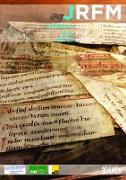- Start
- Materiality of Writing
Materiality of Writing
Angebote / Angebote:
Before we can understand norms or read texts, as human beings we are in
touch with things - we are born into a world full of objects. In the last few decades, the relationship between humans and things has attracted the attention of many disciplines and approaches to culture in the humanities. The material turn has also influenced anthropological reflection within fields that specialise in religion, such as theology and the comparative study of religion.
Looking for things, their agencies, and material practices arising from the interaction between humans and objects allows more comprehensive insight into religious symbols systems, religious communities, and religious traditions. The substance, form, and colour of an artefact, the techniques for producing it, the possibilities for using, touching, wearing, or looking at it, the practices involving it, the ways of preserving, restoring, and destroying it or of passing it from one generation to another are fundamental aspects for us to consider when analysing and interpreting religions. Furthermore, a thing is not necessarily manufactured: materiality includes nature, organicand inorganic matter, vegetal and animal (including human) bodies. Analysing material culture as a crucial aspect of religious communities, symbols, rituals, traditions, and diffusion processes means considering more than just the discursive power of words. Religion is not primarily a system of reflection and philosophical pondering by means of texts, it is an existential experience.
Libri-Titel folgt in ca. 2 Arbeitstagen
